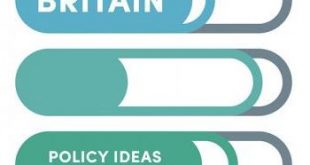I’ve written a blog post about the Trudeau Liberals’ recently-proposed speculation tax on residential real estate owned by non-resident, non-Canadians. The full blog post can be accessed here. Nick Falvo is a Calgary-based research consultant with a PhD in Public Policy. He has academic affiliation at both Carleton University and Case Western Reserve University, and is Section Editor of the Canadian Review of Social Policy/Revue canadienne de politique sociale. You can...
Read More »Unbound: How Inequality Constricts Our Economy — Heather Boushey
Inequality constricts growth by: Obstructing the supply of people and ideas into our economy and limiting opportunity for those not already at the top, which slows productivity growth over time Subverting the institutions that manage the market, making our political system ineffective and our labor markets dysfunctional Distorting demand through its effects on consumption and investment, which both drags down and destabilizes short- and long-term growth in economic output Capitalism...
Read More »Rethinking Britain – How to build a better future
By Sue Konzelmann, John Weeks and Marc Fovargue-Davies ‘Rethinking Britain: Policy Ideas for the Many’ is a publication of Policy Press (19 September 2019), in partnership with PRIME and the Progressive Economic Forum (PEF). Price £14.99, pre-orders £11.99 via Bristol University Press website. It is edited by Sue Konzelmann, Susan Himmelweit,...
Read More »Thomas Piketty’s New Book Brings Political Economy Back to Its Sources — Branko Milanovic
In the same way that Capital in the Twenty-First Century transformed the way economists look at inequality, Piketty’s new book Capital and Ideology will transform the way political scientists look at their own field. ProMarket — The blog of the Stigler Center at the University of Chicago Booth School of BusinessThomas Piketty’s New Book Brings Political Economy Back to Its Sources Branko Milanovic | Visiting Presidential Professor at City University of New York Graduate Center and senior...
Read More »Production and then distribution, or distribution and production together — Branko Milanovic
Must-read! Branko Milanovic sums up the fundamental issue affecting political economy as economics in relation to society. Neoclassical economic is like doing engineering with a total focus on efficiency and ignoring resilience. This approach views redundancy as inefficient. This is like eliminating the emergency brake on vehicles. An economy is the material life-support system for a society and its culture. It is the welfare and progress of the society that set the priorities....
Read More »Economic Policy Institute — Labor Day Series
Economic Policy InstituteBlack workers endure persistent racial disparities in employment outcomesPart of the series Labor Day 2019: How Well Is the American Economy Working for Working People? Summary: Black workers are twice as likely to be unemployed as white workers overall (6.4% vs. 3.1%). Even black workers with a college degree are more likely to be unemployed than similarly educated white workers (3.5% vs. 2.2%). When they are employed, black workers with a college or advanced degree...
Read More »Lars P. Syll — a primary reason for the rise of inequality
Economic liberalism expressed as "free market capitalism" aka neoliberalism is incompatible with political liberalism as liberal democracy owing to the social effects of the inequality that favoring economic liberalism in the above sense leads.Lars P. Syll’s BlogEconomics — a primary reason for the rise of inequalityLars P. Syll | Professor, Malmo University
Read More »Top 1% Up $21 Trillion. Bottom 50% Down $900 Billion. — Matt Bruenig
The insights of this new data series are many, but for this post here I want to highlight a single eye-popping statistic. Between 1989 and 2018, the top 1 percent increased its total net worth by $21 trillion. The bottom 50 percent actually saw its net worth decrease by $900 billion over the same period.… People's Policy ProjectTop 1% Up $21 Trillion. Bottom 50% Down $900 Billion.Matt Bruenig
Read More »The Federal Reserve’s new Distributional Financial Accounts provide telling data on growing U.S. wealth and income inequality — Raksha Kopparam
Wealth disparities between the rich and the poor in the United States have broadened over the past 30 years, according to a new dataset released earlier this month by researchers at the Federal Reserve Board. Their Distributional Financial Accounts is the new dataset that provides quarterly estimates of wealth distribution in the country from 1989 to 2019. 2 The new dataset was created by integrating the Federal Reserve Board’s Financial Accounts with the Survey of Consumer Finances....
Read More »Bill Mitchell — The rich are getting richer in Australia while the rest of us mark time
Only a short blog post today – in terms of actual researched content. Plenty of announcements and news though, a cartoon, and some great music. I have been meaning to write about the household income and wealth data that the ABS released in July, which showed that real income and wealth growth over a significant period for low income families has been close to zero, while the top 20 per cent have enjoyed rather massive gains. These trends are unsustainable. A nation cannot continually be...
Read More » Heterodox
Heterodox


